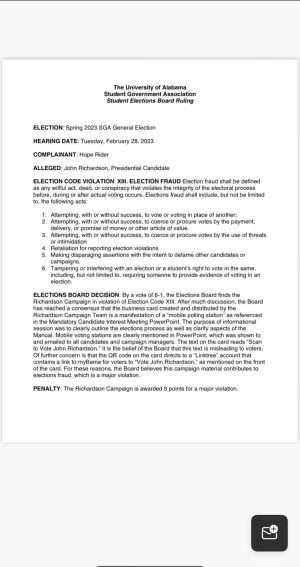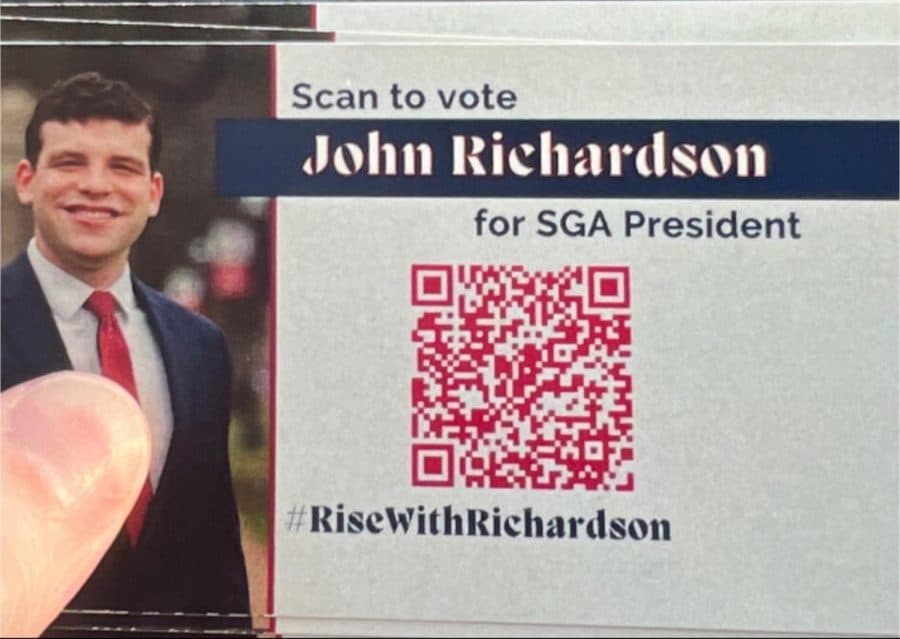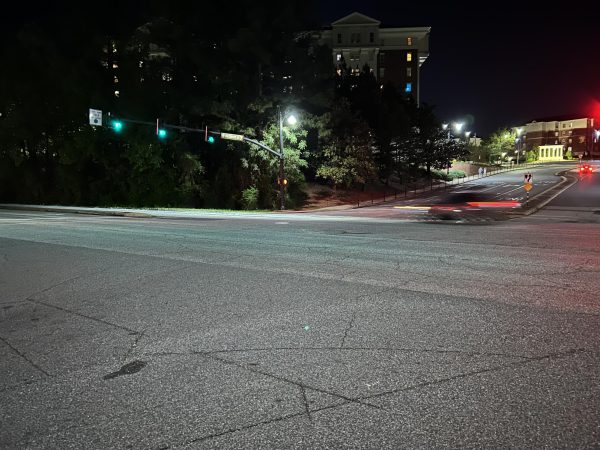Richardson given 9 points by Elections Board for violation not listed in manual, Constitution
March 5, 2023
John Richardson, a candidate for the SGA presidency who lost according to unofficial results, was given nine violation points for election fraud in a March 3 ruling from the Elections Board. Richardson was cited for creating a “mobile polling station” — an offense not outlined anywhere in the Elections Manual or the Constitution. Richardson said he is appealing the decision.
The Elections Board’s position on standalone websites and mobile polling stations was outlined in a PowerPoint sent to candidates prior to the start of campaigning. However, the Constitution states, “The Student Elections Board shall issue decisions in accordance with this Constitution and any rules and regulations created by the Student Elections Board that reside in the Student Elections Board manual.” The manual does not contain any references to standalone websites or mobile polling stations.
The ruling, which has yet to be published on the SGA website, was provided to The Crimson White by Richardson’s campaign, along with a recording of the Feb. 28 hearing held in response to the complaint.
The violation in question involved Richardson’s distribution of business cards with his likeness and a QR code, saying “Scan to vote John Richardson for President.” Scanning the QR code leads to a Linktree which includes more information about the campaign and a link to myBama. The complaint was filed against Richardson’s campaign by Hope Rider, the chief of staff for SGA Vice President of External Affairs Collier Dobbs, who beat Richardson for the presidency according to unofficial results.
Board’s reasoning; Richardson’s response
The Elections Manual says election fraud is defined as “any willful act, deed, or conspiracy that violates the integrity of the electoral process before, during or after actual voting occurs.”
In its ruling, the board said it “reached a consensus that the business card created and distributed by the Richardson Campaign Team is a manifestation of a ‘mobile polling station’ … The text on the card reads ‘Scan to Vote John Richardson.’ It is the belief of the Board that this text is misleading to voters.”

Richardson said he disputes the verdict reached by the Elections Board and plans to appeal to the Judicial Board.
“Our focus is directed specifically towards the elections board’s explicitly stated disregard of the SGA constitution,” Richardson said in a written statement. “Article VIII of the constitution is clear. The elections board shall only rule on violations explicitly stated in the constitution or the elections manual.”
“When directly confronted with this fact, the elections board declined that the cited passage was relevant, since they felt their assumed power to interpret the constitution as they saw fit outweighed the constitution itself,” Richardson continued. “We look forward to appealing the election board’s decision.”
Rule about “mobile polling stations” and “standalone websites” not in manual or Constitution
In a recording of the hearing, Scott Sonnier, the assistant chair of the Elections Board, said that the board felt it could find candidates running for SGA positions in violation of rules that are not explicitly in the Elections Manual or the SGA Constitution.
Sonnier said that while the prohibition was not in either the Elections Manual or the Constitution, it was in a PowerPoint presentation given to all candidates before the start of the campaign period. The presentation does include rules against mobile voting stations and standalone websites, but the presentation itself is not made publicly available or mentioned as a set of guidelines in the Elections Manual and Constitution.
“It’s the job of the Elections Board to interpret the manual as best we can … and so while it is true that the usage of mobile voting stations is not in the Elections Manual … the PowerPoint at the interest sessions serves as our interpretation of the manual, which is sent to everyone [who runs for an SGA position],” Sonnier said.
“Just because it is not in the manual, doesn’t mean that, necessarily, that it’s not in violation of anything,” Sonnier said during the hearing after Zach Johnson, Richardson’s campaign manager, pointed out that the violation Richardson was charged with was not in either the Elections Manual or the Constitution. “The point of my saying that we have to interpret the manual as best we can is that there is never going to be an airtight rule or regulation for every single case or violation that we come across.”
Sonnier remarks come after the Elections Manual was updated to add language to section XIX.D, which deals with Major Violations. Last year, it only listed four examples of what would constitute a Major Violation: election fraud, campaign ethics, failure to file financial disclosure reports, and failure to attend mandatory candidate meetings or to make alternate arrangements.
Now, section XIX.D says, “Examples include, but are not limited to,” which broadens the kinds of offenses candidates could potentially be held in violation for. Sonnier said that the Elections Manual is only updated once per year. The Constitution states, “The Elections Manual is to be revised once per term and must be completed one month prior to the date of the spring election.”
The Constitution does not define if “term” means semester or the term of appointment for the Elections Board.
Rider, who filed the complaint against Richardson, cited sections “X.I.I” and XIX.B of the Elections Manual to argue, “Scanning this QR code leads you to a stand-alone website, outlawed in the manual. Further, this provides a mobile voting station and persuasion to vote for a specific candidate.”
However, section X.I.I of the Elections Manual does not exist, while XIX.B simply defines a minor violation. There is no language in the Elections Manual prohibiting the use of a standalone website as Rider claimed. Furthermore, the Richardson campaign argued at the hearing that a Linktree is not a standalone website, saying that if it was, then any website with a unique URL, such as an Instagram profile, would be prohibited as well.
Rider’s complaint was one of two filed against Richardson’s campaign, the other being filed by Luke Schroeder.
“Providing a mobile polling station or providing instructions on how to vote for a particular student is against the elections board manual. Specifically, this was violated as the business cards being passed out state, ‘Scan to Vote John Richardson for SGA President’ A clear violation of the manual,” Schoeder said in his complaint, which was provided to The CW by Richardson’s campaign.
Schroeder did not cite any specific sections in the Elections Manual to back up his claim. No such provision exists in the manual as Schroeder asserts in his complaint, and no ruling has been made on the complaint as of publication.
Ansley Stamper, the chair of the Elections Board, said that examples of violations not in the explicitly stated in the manual were included in the PowerPoint provided to all campaigns.
“In the future, we will be updating the manual to be more comprehensive,” she said.
Stamper did not answer multiple requests to answer questions regarding why the manual was not updated with these rules when the manual was last updated in January, as well as what the position of the Board was on the passage of the Constitution that says, “The Student Elections Board shall issue decisions in accordance with this Constitution and any rules and regulations created by the Student Elections Board that reside in the Student Elections Board manual.”
Sonnier did not respond to a request for comment.











